Table of Contents
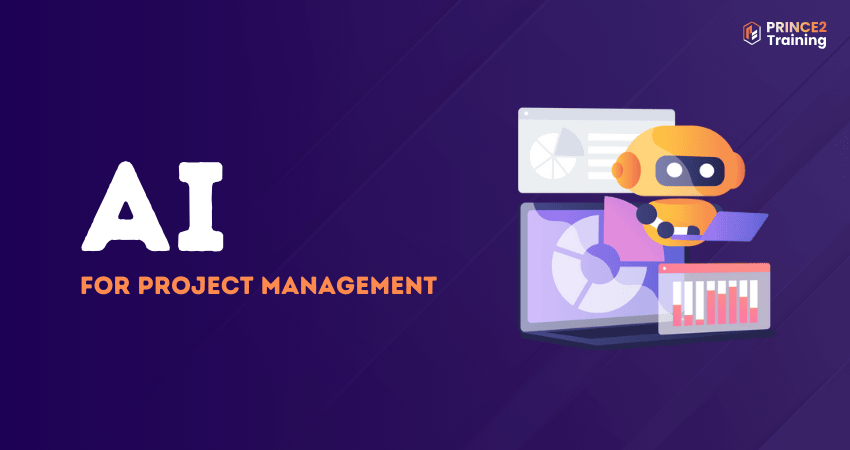
Ever spent hours managing endless tasks, chasing updates, and fighting to meet deadlines, only to realise your project is still off track? You’re not alone. Today’s projects are more complex, fast-paced, and stressful than ever. That’s where Artificial Intelligence in Project Management steps in, helping teams work smarter by automating tasks, predicting risks, and streamlining workflows.
In this blog, we’ll cover everything about Artificial Intelligence in Project Management, its meaning, impact, applications, and benefits. We’ll also explore the best tools, implementation practices, and future trends to help you manage projects smarter and faster.
Table of Contents
1) What is Artificial Intelligence in Project Management?
2) The Impact of AI on Project Management
3) Applications of AI in Project Management
4) Key Benefits of AI in Project Management
5) Best AI Tools for AI Project Management
6) Best Practices for Implementing AI in Project Management
7) What is the Future of AI in Project Management?
8) Conclusion
What is Artificial Intelligence in Project Management?
Artificial Intelligence (AI) in Project Management refers to using intelligent systems, tools, and algorithms to manage projects more effectively. It helps automate repetitive tasks, analyse large sets of data, improve decision-making, and optimise resource allocation, making projects more efficient and successful.
Artificial Intelligence uses technologies like machine learning and predictive analytics to help Project Managers in many ways. It makes project planning easier by creating clear schedules, assigning resources wisely, and giving real-time progress updates. AI also spots possible risks early, prepares helpful reports, and saves manager’s time so they can focus on important decisions instead of routine tasks.
The Impact of AI on Project Management
Artificial Intelligence is changing the way projects are managed. It helps by doing repetitive tasks, saving time, and letting managers focus on important work. AI enhances planning, decisions, risks, resources, and communication, making projects easier and more successful.
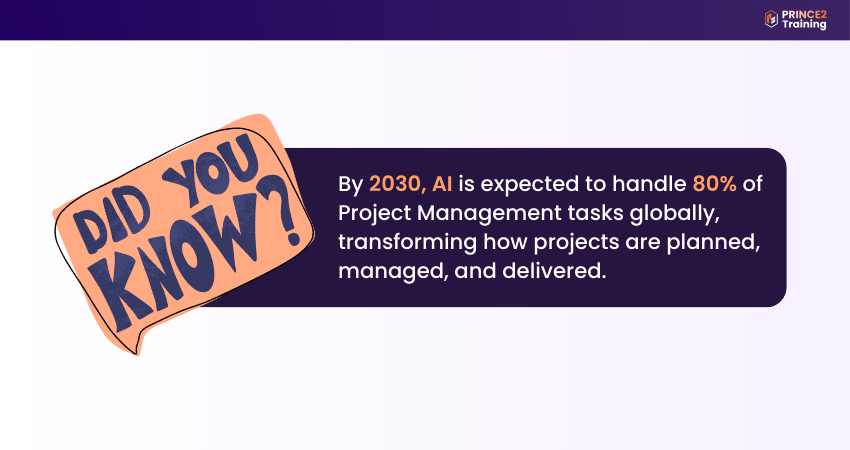
1) Automation of Repetitive Tasks:
AI takes care of simple tasks like data entry, reports, and scheduling. This saves time and lets Project Managers focus on planning and solving problems.
2) Better Planning and Scheduling:
AI studies past project data to create accurate plans and timelines. It can also update schedules automatically based on progress and available resources.
3) Smarter Decision-making:
AI analyses project data and gives helpful insights. Managers can spot challenges early and make better decisions using facts, not guesses.
4) Improved Risk Management:
AI detects possible risks early and alerts managers in advance. This helps prevent problems and keeps projects on track.
5) Efficient Resource Allocation:
AI checks team capacity and project needs to assign work wisely. This avoids overwork and ensures tasks run smoothly.
6) Easier Communication: AI tools like chatbots and assistants handle regular updates, answer simple questions, and create reports. This keeps teams connected and improves teamwork.
Be a leader who balances governance and agility in dynamic environments. Join our PRINCE2 Agile® Practitioner Training today!
Applications of AI in Project Management
AI in Project Management automates routine tasks, making work faster and easier. It also helps plan better, manage risks, use resources well, and make smarter decisions. Let’s see the key areas where AI is helping most.
1) Project Planning and Scheduling
AI tests time limits, resources and task dependencies to create correct timelines. If priorities change, it updates schedules automatically.
Example: Tools like Motion reschedule tasks instantly when unexpected delays happen.
2) Automating Routine Tasks
AI manages repeating work like sending notifications, updating dashboards and preparing reports, saving managers time.
Example: ClickUp automates task updates and sends deadline reminders automatically.
3) Leveraging Predictive Analytics
AI examines historical project data to predict future outcomes. It highlights potential risks, delays, and budget overruns before they happen, allowing for proactive planning.
Example: Wrike uses predictive analytics to warn about possible missed deadlines before they occur.
4) Upskilling and Developing Talent
AI-powered learning platforms can identify performance trends and skill gaps, recommending personalised development paths for employees. This helps teams continuously grow and stay competitive in a fast-changing landscape.
Example: AI tools can analyse employee data to suggest targeted upskilling opportunities based on individual needs.
5) Supporting Better Decision-making
AI tools process vast amounts of data and provide insights in seconds. Managers can compare scenarios and choose the most effective solutions confidently.
Example: Notion AI processes project data and suggests effective ways to improve workflows.
6) Identifying and Managing Risks
AI constantly monitors project data to detect risks, such as cost overruns or missed deadlines, and suggests preventive measures.
Example: Procore detects potential risks early and alerts managers before problems arise.
7) Managing Resources Effectively
AI analyses workloads and distributes tasks fairly among team members, improving productivity and reducing burnout.
Example: Asana uses AI to balance workloads and ensure tasks are distributed evenly across the team.
8) Tracking and Monitoring Projects
AI-powered dashboards provide real-time updates on project progress, budgets, and timelines, helping managers identify and resolve issues faster.
Example: Smartsheet provides live project tracking and alerts managers when issues occur.
Master governance and Agile mindsets to manage projects confidently. Join our PRINCE2 Agile® Foundation Training now!
Key Benefits of AI in Project Management
Artificial Intelligence adoption brings several advantages that help improve project outcomes. These are the key Benefits of AI and Project Management:
1) Smarter Resource Allocation
Artificial Intelligence helps managers assign the right tasks to the right people by looking at skills, workload, and availability. This avoids overwork and ensures everyone’s time is used wisely.
2) Better Decision-making Capabilities
Artificial Intelligence studies project data and gives useful insights so managers can make better choices. Decisions become more accurate because they’re based on real data, not just assumptions.
3) Stronger Communication Across Teams
AI-powered tools make it easier to share updates, reports, and messages, keeping everyone connected. Even if teams work from different locations, Artificial Intelligence helps them stay on the same page.
4) Automated Task Handling
Artificial Intelligence takes care of repetitive tasks like sending reminders, updating dashboards, and preparing reports. This saves time and lets managers focus on planning and strategy instead.
Best AI Tools for AI Project Management
AI-powered tools make Project Management easier, faster, and more organised. They help automate tasks, improve collaboration, and track project progress effectively. Here are some of the best tools:
1) Motion
Motion uses AI to plan your schedule automatically. It arranges tasks, meetings, and deadlines based on priority and availability, saving time and reducing stress.
Best for: Managers who want smart scheduling and better time management.
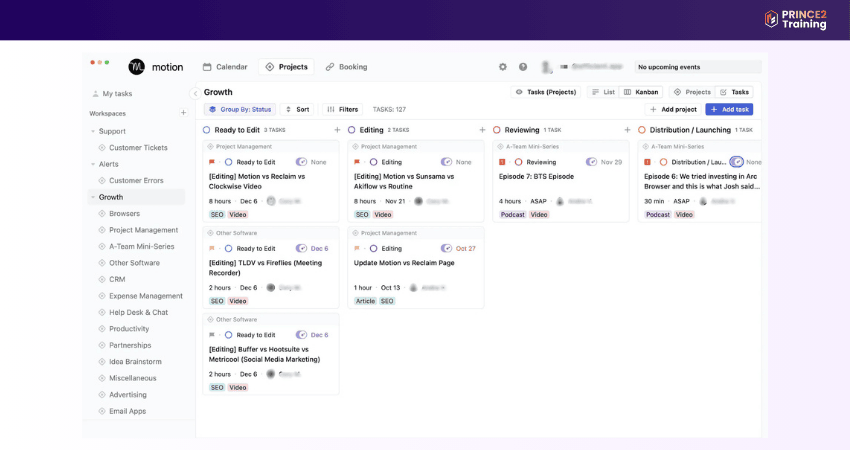
2) ClickUp
ClickUp is an all-in-one Project Management tool. It lets you manage tasks, create reports, track progress, and collaborate with your team. Its AI features automate workflows and give helpful suggestions to improve productivity.
Best for: Teams looking for a complete AI-powered management solution.
3) Trello
Trello uses a visual Kanban-style board to organise tasks and workflows. Its AI features help automate repetitive actions, such as moving tasks, setting deadlines, and sending reminders.
Best for: Teams that prefer simple, visual task management.
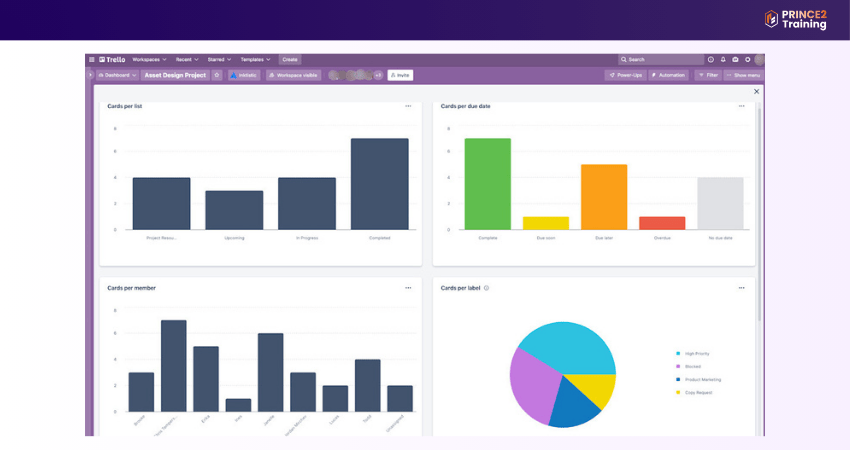
4) Notion
Notion combines note-taking, task management, and collaboration in one tool. Its AI helps generate content, summarise project notes, and provide insights for better planning and execution.
Best for: Teams that need a central hub for ideas, documents, and tasks.
5) Asana
Asana focuses on tracking tasks, managing deadlines, and improving team collaboration. Its AI-powered features help predict delays, balance workloads, and send smart updates.
Best for: Teams handling multiple projects with tight deadlines.
“Learn to deliver projects with discipline, agility, and stakeholder collaboration. Join our PRINCE2 Agile® Foundation and Practitioner Training now!
Best Practices for Implementing AI in Project Management
Using AI Project Management can make your work easier, faster, and more accurate, but it’s important to follow the right steps for the best results. Here are some best practices to keep in mind:
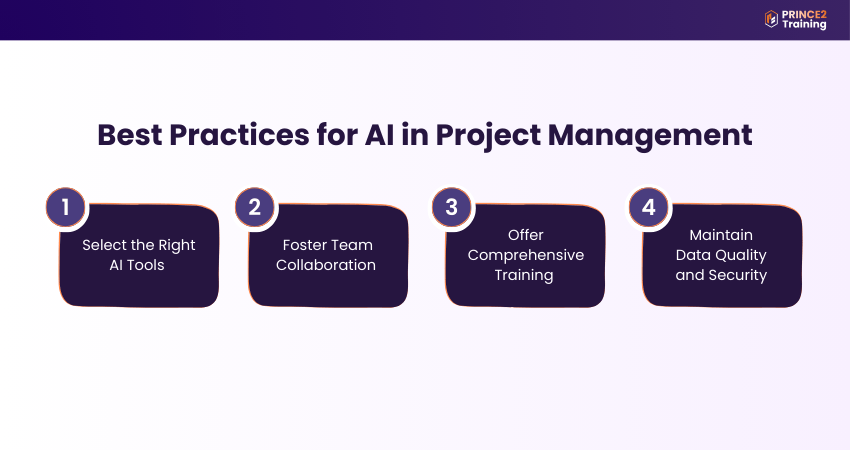
1) Select the Right AI Tools
Choose AI tools that align with your project requirements and your team's workflow. Avoid overcomplicated platforms packed with unnecessary features, as they can create confusion and slow progress.
Tip: Prioritise tools that are user-friendly and solve specific challenges effectively.
2) Foster Team Collaboration
Ensure your team is comfortable with the adoption of AI tools. Involve them early in the process, explain the benefits clearly, and promote open communication to encourage smooth integration and collaboration.
Tip: When teams understand how AI helps, adoption becomes easier.
3) Offer Comprehensive Training
Provide proper training so everyone knows how to use the AI tools effectively. Without training, the tools might seem confusing and reduce productivity instead of improving it.
Tip: Short tutorials and hands-on sessions can build team confidence.
4) Maintain Data Quality and Security
AI produces the best results when it’s powered by accurate, up-to-date data. Always ensure your data is clean, trustworthy, and secure to generate reliable insights while safeguarding sensitive information.
Tip: High-quality data leads to smarter AI decisions and better project outcomes.
What is the Future of AI in Project Management?
The future of AI Project Management looks very bright. AI will make projects smarter, faster, and more efficient by automating tasks and helping managers make better decisions. Here’s what we can expect:
1) Smarter Virtual Project Assistants: AI tools will manage scheduling, updates, reports, and queries, so managers can spend more time on planning and leadership.
2) Better Predictive Capabilities: AI will spot risks, delays, and resource shortages early, giving managers time to solve problems before they happen.
3) Improved Real-time Collaboration: AI will make it easier for remote and on-site teams to work together with automatic updates, real-time insights, and smart communication tools.
4) Adaptive Project Strategies: AI will learn from ongoing projects and change plans automatically based on progress, priorities, or unexpected issues.
5) Data-driven Leadership: Managers will use AI insights and analytics to make quicker, smarter, and more confident decisions.
Conclusion
Artificial Intelligence in Project Management is revolutionising how projects are planned, executed, and delivered. By automating tasks, predicting risks, and enhancing decisions, Artificial Intelligence helps teams work smarter and achieve better outcomes. Using AI-powered tools helps Project Managers boost efficiency and improve collaboration. It also ensures timely project delivery while staying competitive in today’s fast-changing environment.
Achieve Leading Project Standards: Learn PRINCE2 with our PRINCE2® Certification – Join now!




 Back
Back


 Back to
topics
Back to
topics









